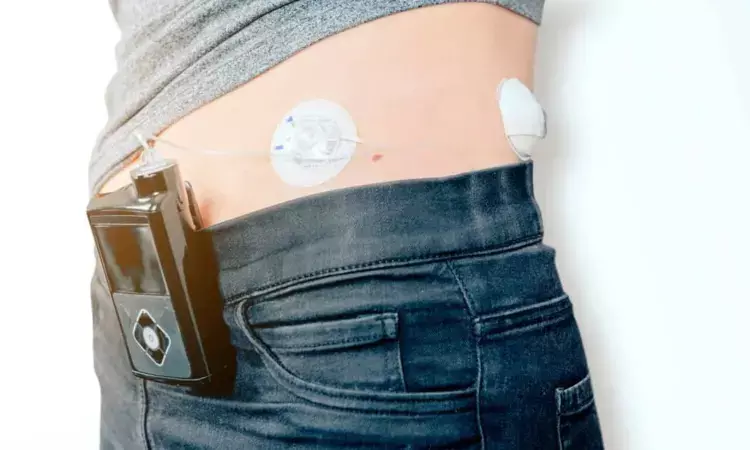- Home
- Medical news & Guidelines
- Anesthesiology
- Cardiology and CTVS
- Critical Care
- Dentistry
- Dermatology
- Diabetes and Endocrinology
- ENT
- Gastroenterology
- Medicine
- Nephrology
- Neurology
- Obstretics-Gynaecology
- Oncology
- Ophthalmology
- Orthopaedics
- Pediatrics-Neonatology
- Psychiatry
- Pulmonology
- Radiology
- Surgery
- Urology
- Laboratory Medicine
- Diet
- Nursing
- Paramedical
- Physiotherapy
- Health news
- Fact Check
- Bone Health Fact Check
- Brain Health Fact Check
- Cancer Related Fact Check
- Child Care Fact Check
- Dental and oral health fact check
- Diabetes and metabolic health fact check
- Diet and Nutrition Fact Check
- Eye and ENT Care Fact Check
- Fitness fact check
- Gut health fact check
- Heart health fact check
- Kidney health fact check
- Medical education fact check
- Men's health fact check
- Respiratory fact check
- Skin and hair care fact check
- Vaccine and Immunization fact check
- Women's health fact check
- AYUSH
- State News
- Andaman and Nicobar Islands
- Andhra Pradesh
- Arunachal Pradesh
- Assam
- Bihar
- Chandigarh
- Chattisgarh
- Dadra and Nagar Haveli
- Daman and Diu
- Delhi
- Goa
- Gujarat
- Haryana
- Himachal Pradesh
- Jammu & Kashmir
- Jharkhand
- Karnataka
- Kerala
- Ladakh
- Lakshadweep
- Madhya Pradesh
- Maharashtra
- Manipur
- Meghalaya
- Mizoram
- Nagaland
- Odisha
- Puducherry
- Punjab
- Rajasthan
- Sikkim
- Tamil Nadu
- Telangana
- Tripura
- Uttar Pradesh
- Uttrakhand
- West Bengal
- Medical Education
- Industry
'Bionic pancreas' bests standard care for improving type 1 diabetes control: NEJM

USA: Using a bionic pancreas improved glycated hemoglobin (HbA1c) in adults and children with type 1 diabetes better than standard-of-care management, according to results from a 13-week multicenter clinical trial published in the New England Journal of Medicine.
The bionic pancreas is a pocket-size wearable device that uses next-generation technology to deliver insulin automatically. Automated insulin-delivery systems (also known as the artificial pancreas or closed-loop control systems) track the blood glucose levels of a person using a continuous glucose monitor; needed insulin is automatically delivered via a pump. These systems replace dependence on fingerstick tests of glucose levels, glucose monitoring that still needs multiple daily insulin injections, and non-automated pumps.
Currently used semiautomated insulin-delivery systems need individualized insulin regimens for the therapy and meal dose initialization based on carbohydrate counting for routine operation. In contrast, the bionic pancreas is initialized based only on body weight, makes all decisions relating to doses, automatically delivers insulin, and uses meal announcements without carbohydrate counting.
Irl Hirsch, a diabetes expert at the University of Washington School of Medicine, and colleagues conducted a 13-week, multicenter, randomized trial that included persons at least six years of age with type 1 diabetes. They were randomized in the ratio of 2:1 to receive either bionic pancreas treatment with insulin aspart or insulin lispro (n=219) or standard care (n=107), defined as any insulin-delivery method with unblinded, real-time continuous glucose monitoring. The study's primary outcome was the hemoglobin A1C level at 13 weeks.
Key findings of the study:
- In the bionic-pancreas group, the glycated hemoglobin level decreased from 7.9% to 7.3%, and it did not change in the standard-care group (it was at 7.7% at both time points).
- The percentage of time that the glucose level, as assessed by continuous glucose monitoring, was below 54 mg per deciliter and did not differ significantly between the two groups.
- The rate of severe hypoglycemia was 17.7 events per 100 participant-years in the bionic-pancreas group and 10.8 events per 100 participant-years in the standard-care group.
- No occurrence of diabetic ketoacidosis episodes was seen in either group.
Dr. Irl Hirsch said in a press release that "this pump uses more artificial intelligence than other available pumps on the market. It identifies trends of the continuous glucose monitor to give insulin that keeps blood glucose in the normal range — without patients having to count carbohydrates.
"Other than patients who closely manage their type 1 diabetes, there is also another huge group of patients who don't pay much heed," considering this, the findings could be relevant for those patients with regards to better control of their blood sugar.
Reference:
The study, "Multicenter, Randomized Trial of a Bionic Pancreas in Type 1 Diabetes," was published in the New England Journal of Medicine. DOI: 10.1056/NEJMoa2205225
Dr Kamal Kant Kohli-MBBS, DTCD- a chest specialist with more than 30 years of practice and a flair for writing clinical articles, Dr Kamal Kant Kohli joined Medical Dialogues as a Chief Editor of Medical News. Besides writing articles, as an editor, he proofreads and verifies all the medical content published on Medical Dialogues including those coming from journals, studies,medical conferences,guidelines etc. Email: drkohli@medicaldialogues.in. Contact no. 011-43720751


